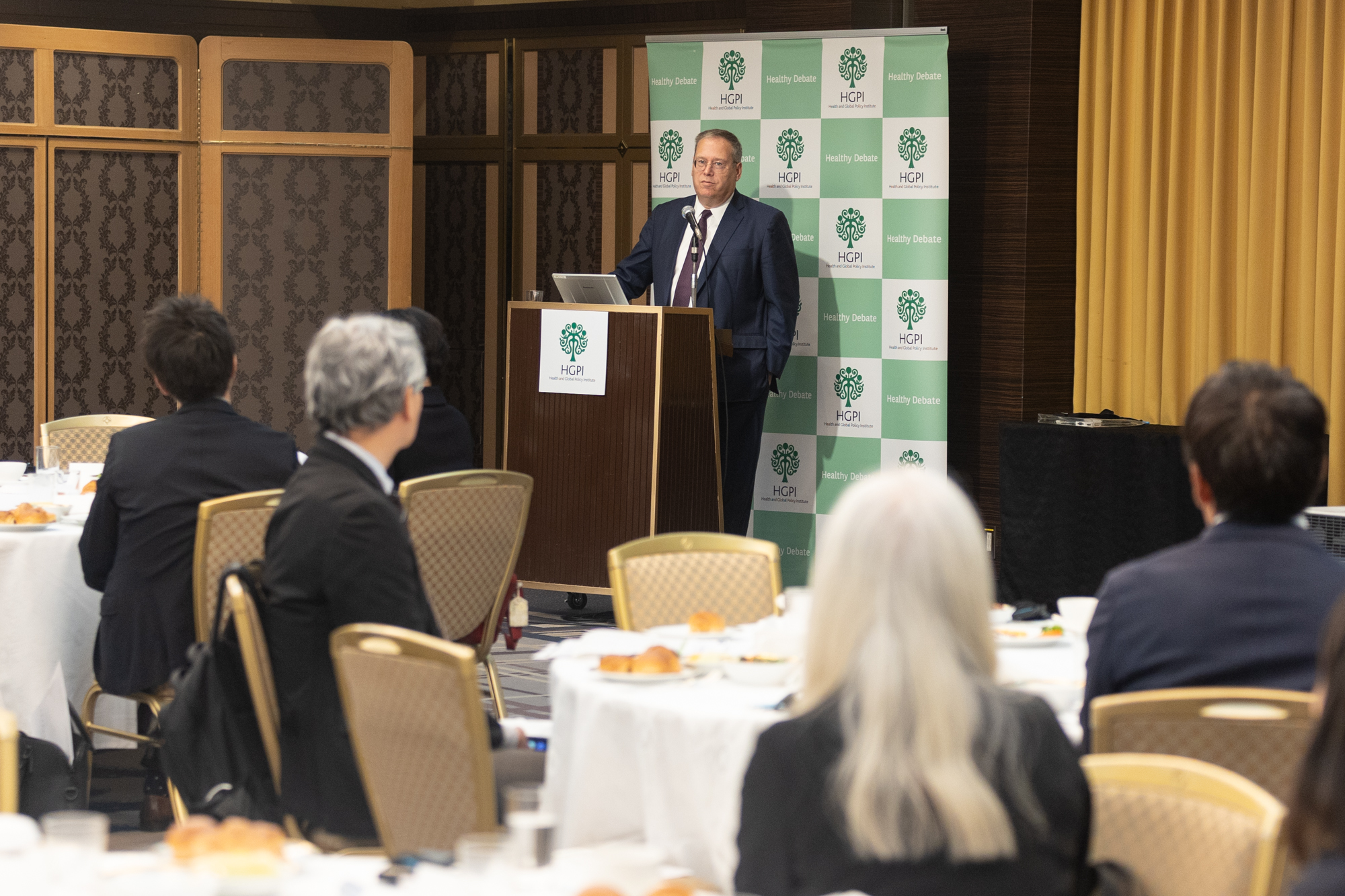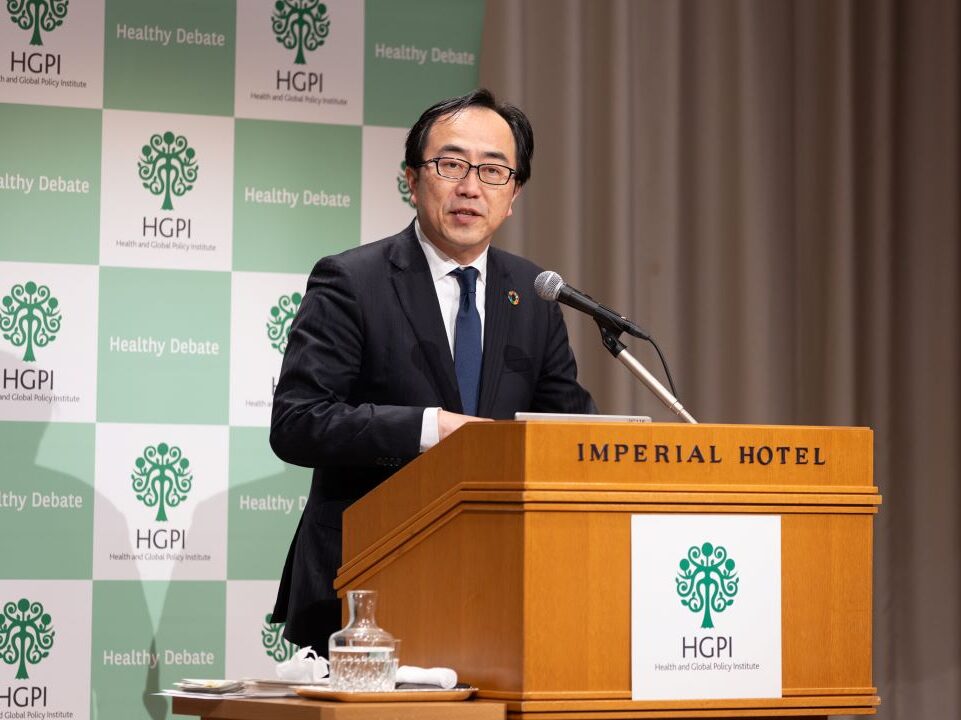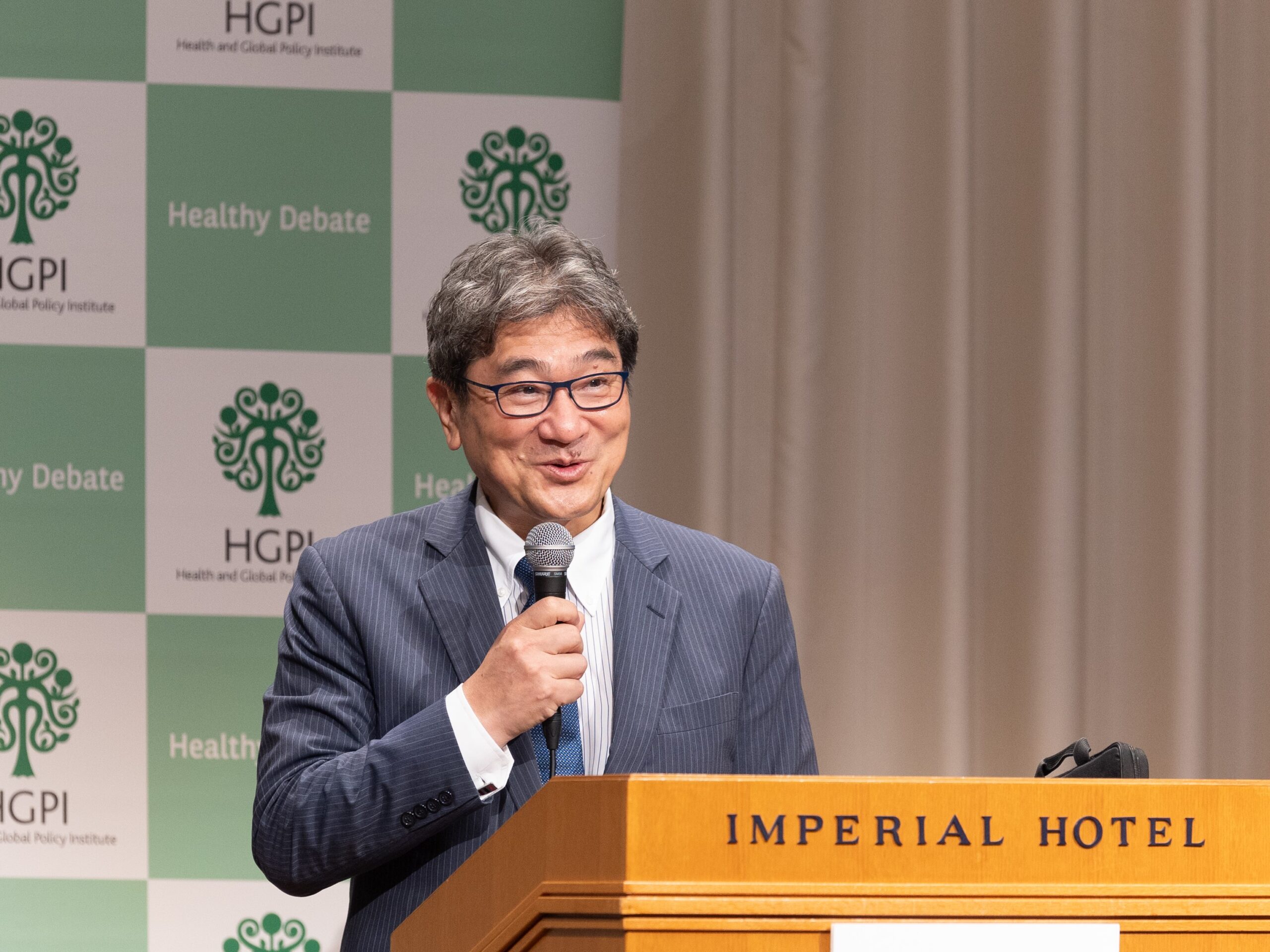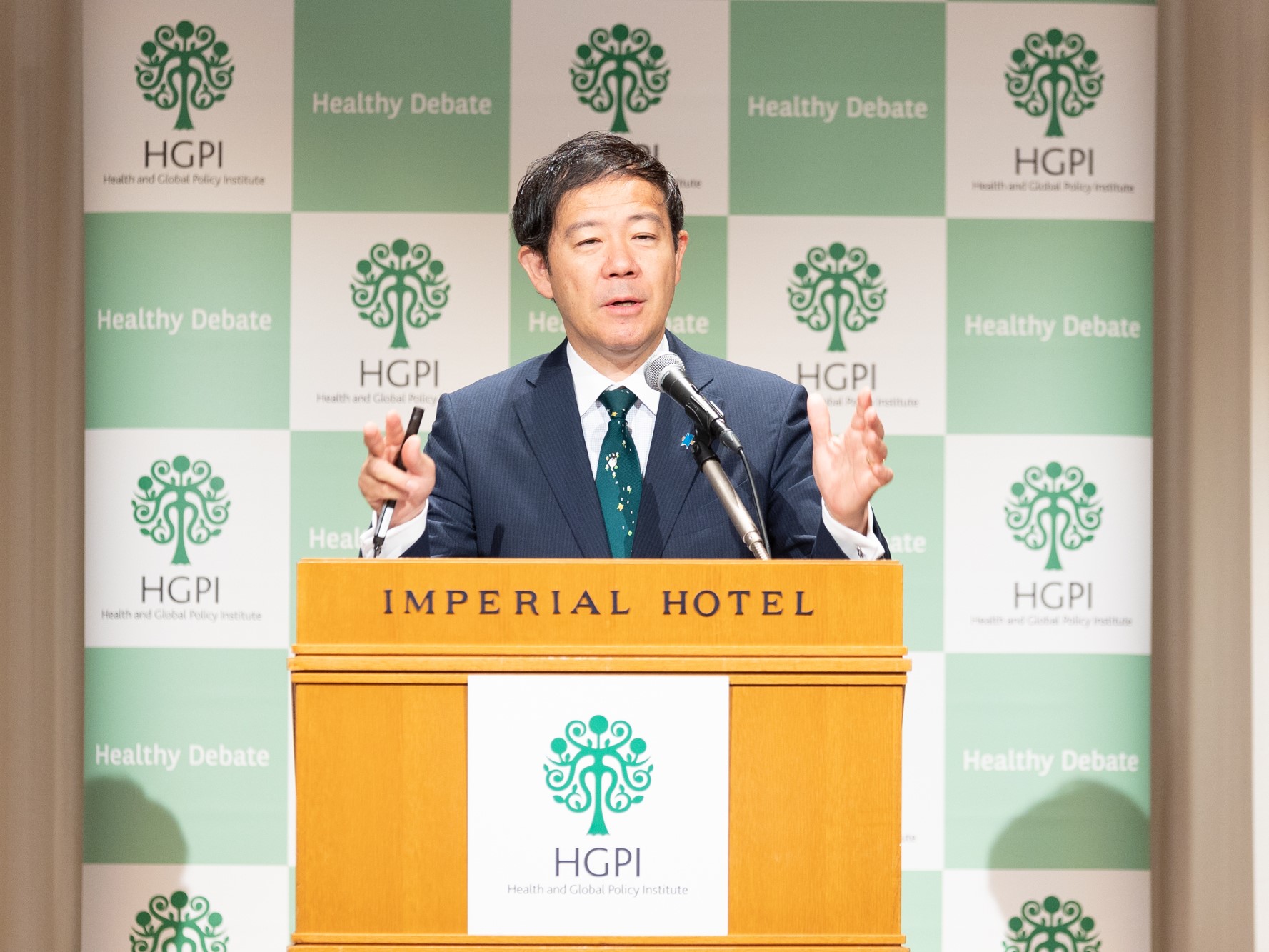[Event Report] The 52nd Special Breakfast Meeting – US-China Competition and Healthcare Industry: New Frontier of Economic Security (October 23, 2023)
date : 2/2/2024
![[Event Report] The 52nd Special Breakfast Meeting – US-China Competition and Healthcare Industry: New Frontier of Economic Security (October 23, 2023)](https://hgpi.org/en/wp-content/uploads/sites/2/1F7A9034_sbm_52-1-top.jpg)
For the 52nd Special Breakfast Meeting, we hosted Mr. Kurt Tong (Managing Director, The Asia Group). Based on his experience as a career diplomat and senior foreign affairs officer with the US Department of State for over 30 years and his current role as Managing Director of The Asia Group, Mr. Tong spoke about the intricate geopolitical dynamics between the US, China, and Japan at the intersection of regional security, health care, and economics.
Key points of the lecture:
- US and China are in a “quasi Cold War” with economic interdependence and military wariness. While cooperation is stagnant, neither desires open conflict. US-China relations declined in 2023 due to the balloon incident, Pelosi’s Taiwan visit, and trade restrictions. The upcoming Biden-Xi meeting will address sensitive topics like Taiwan.
- More economically dependent on China, Japan adopts a cautious approach compared to the US, including avoiding tariffs and Taiwan conflict.
- Frequent communication and minimal economic friction mark the strong US-Japan relationship, allowing for collaboration on various challenges.
- Japan’s system disincentivizes innovation and new entrants. Policy reforms are needed to revitalize the sector.
- Due to the complex geopolitical situation, US government intervention in Japan’s pharma industry is limited. Moreover, trade restrictions, unfair competition, and data flow issues pose challenges in the Chinese pharmaceutical space.
“Bad but stable” US-China Relations
The US and China exist in a tense “quasi Cold War” where economic interdependence is intertwined with military wariness. Neither desires open conflict, but cooperation remains stagnant. The US strategy bets on isolating China to hinder its growth, while China anticipates internal US strife leading to its decline. Japan’s “Free and Open Indo-Pacific(FOIP)” aims to establish a rules-based order for China to eventually accept. This approach is exemplified by significant trade ties like Apple and Tesla’s reliance on Chinese manufacturing, the contested South China Sea where US-China military exercises highlight friction, US tariffs and technology export restrictions as part of their strategy, and China’s retaliatory tariffs and anti-US propaganda campaigns showcasing their response.
Fall Marked by Missed US-China Opportunities
The first half of 2023 saw a decline in US-China relations, punctuated by the balloon incident and Pelosi’s visit to Taiwan. Efforts to repair this damaged relationship culminate in a November 2023 Biden-Xi meeting tackling sensitive topics like Taiwan, where compromise remains elusive. The decline was exacerbated by the US shooting down a Chinese “spy balloon” leading to China sanctioning US defense contractors. The upcoming Biden-Xi meeting at the Asia-Pacific Economic Cooperation (APEC) Leaders’ Summit in San Francisco will focus on economic issues, climate change, and Taiwan, highlighting the sensitivity of the latter topic where Taiwan, self-governed yet claimed by China, faces potential military unification threats.
Divergences on China in US-Japan Relationship
Compared to the US, Japan’s heavier economic dependence on China fosters a more cautious approach. This is evident in their over 20% trade dependence on China and their reluctance to join US tariffs on China. Japan’s policy consistency contrasts with US fluctuations due to political shifts, and their geographical proximity to Taiwan makes them acutely aware of potential conflict arising from that issue. Unlike the US sending warships near Taiwan, Japan has abstained, showcasing their contrasting policies.

US-Japan Ties Strengthen Amid Pressures
Excellent communication and minimal economic friction characterize US-Japan relations. Regular summits and cabinet-level meetings solidify strong communication, and a bilateral trade agreement reduces tariffs on numerous goods, minimizing economic friction. This strong relationship allows for collaboration on various challenges, including those posed by China, Russia, and the Middle East, exemplifying their joint efforts to counter China’s influence in the Indo-Pacific region.
TAG White Paper on Pharma Policy
The Asia Group’s White Paper on Pharma Policy identifies critical challenges hindering Japan’s pharmaceutical industry and proposes solutions to revitalize this sector. Additionally, the fee-for-service payment method and social security system, which offer little incentive for medical providers to improve efficiency in healthcare delivery and for individuals to engage in prevention, focus on controlling drug prices while also leading to the suppression of innovation and investment. This, coupled with two specific pricing policies – the “co-factor zero” rule and the Price Maintenance Premium system’s corporate status criteria – further disadvantages new entrants and foreign companies, restricting access to novel drugs. The paper urges the Japanese government to eliminate these “low-hanging fruit” policies to stimulate innovation and attract new players, ultimately benefiting patients. While acknowledging the complex geopolitical situation with China and limited potential for US government intervention, the paper suggests possible support from US industry and academia. However, it also anticipates increasing difficulties in the Chinese pharmaceutical space due to trade restrictions, unfair competition, and data flow issues. In essence, the paper calls for targeted policy reforms in Japan to foster a more vibrant and innovative pharmaceutical sector, while navigating the broader geopolitical landscape and its impact on the industry.
(Photographed by: Kazunori Izawa)
■Speaker Profile
Mr. Kurt Tong (Managing Partner, The Asia Group)
Mr. Kurt Tong is a Managing Partner and member of the Executive Committee at The Asia Group, where he leads consulting teams focused on Japan, China and Hong Kong, and on East Asia regional policy matters. He also leads the firm’s innovative thought leadership programs. A leading expert in diplomacy and economic affairs in East Asia, Mr. Tong brings thirty years of experience in the Department of State as a career Foreign Service Officer and member of the Senior Foreign Service.
Top Research & Recommendations Posts
- [Policy Recommendations] The Path to a Sustainable Healthcare System: Three Key Objectives for Public Deliberation (January 22, 2026)
- [Research Report] The 2025 Public Opinion Survey on Healthcare in Japan (March 17, 2025)
- [Research Report] Perceptions, Knowledge, Actions and Perspectives of Healthcare Organizations in Japan in Relation to Climate Change and Health: A Cross-Sectional Study (November 13, 2025)
- [Policy Recommendations] Reshaping Japan’s Immunization Policy for Life Course Coverage and Vaccine Equity: Challenges and Prospects for an Era of Prevention and Health Promotion (April 25, 2025)
- [Research Report] The 2023 Public Opinion Survey on Satisfaction in Healthcare in Japan and Healthcare Applications of Generative AI (January 11, 2024)
- [Public Comment Submission] “Assessment Report on Climate Change Impacts in Japan (Draft Overview)” (December 24, 2025)
- [Policy Recommendations] Developing a National Health and Climate Strategy for Japan (June 26, 2024)
- [Research Report] The Public Opinion Survey on Child-Rearing in Modern Japan (Final Report) (March 4, 2022)
- [Research Report] Survey of Japanese Physicians Regarding Climate Change and Health (December 3, 2023)
- [Policy Recommendations] Achieving Equity in Multidisciplinary Pain Treatment and Support Systems for Pain Management (March 31, 2023)
Featured Posts
-
2026-01-09
[Registration Open] (Hybrid Format) Dementia Project FY2025 Initiative Concluding Symposium “The Future of Dementia Policy Surrounding Families and Others Who Care for People with Dementia” (March 9, 2026)
![[Registration Open] (Hybrid Format) Dementia Project FY2025 Initiative Concluding Symposium “The Future of Dementia Policy Surrounding Families and Others Who Care for People with Dementia” (March 9, 2026)](https://hgpi.org/en/wp-content/uploads/sites/2/dementia-20260309-top.png)
-
2026-02-05
[Registration Open] (Webinar) The 141st HGPI Seminar “Current Status and Future Prospects of Korea’s Obesity Policy: Voices of People with Lived Experience in Policy Promotion” (March 3, 2026)
![[Registration Open] (Webinar) The 141st HGPI Seminar “Current Status and Future Prospects of Korea’s Obesity Policy: Voices of People with Lived Experience in Policy Promotion” (March 3, 2026)](https://hgpi.org/en/wp-content/uploads/sites/2/hs141-top-1.png)
-
2026-02-06
[Research Report] AMR Policy Update #5: Cancer Care and AMR (Part 2)
![[Research Report] AMR Policy Update #5: Cancer Care and AMR (Part 2)](https://hgpi.org/en/wp-content/uploads/sites/2/HGPI_20260204_AMR-Policy-Update-5.png)







